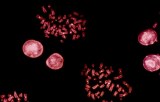
Cytogenetics
The purpose of cytogenetics is to study the structure and normal and pathological functioning of chromosomes (condensation, recombination, repair, segregation, transmission) and chromatin (organization and role in the regulation of gene expression).
The purpose of medical cytogenetics is to detect constitutional or acquired chromosomal abnormalities using microscopic techniques (banding techniques, molecular cytogenetics techniques) or molecular biology to establish a biological diagnosis and to provide genetic counseling. These abnormalities can be of number (more or less of 46 chromosomes), of structure (modification in the succession of several loci) or of repair (chromosomal breaks).
Molecular cytogenetics is a field of cytogenetics developing techniques, based on DNA sequence homologies, allowing the specific identification of all or part of one or more chromosomes.
There are 2 types of cytogenetic technique:
- Classical cytogenetics of culturing the samples to establish a karyotype to identify abnormalities in the number of chromosomes for example
- Molecular cytogenetics which is a karyotype complementary technique based on in situ hybridization (ISH).





